#amazons history
Text

The Goddes of Wonder Woman Historia Vol 3 by Nicola Scott
From left to right:
• HESTIA, of the fire that burns inside
• ARTEMIS, of that which cannot be contained
• DEMETER, of the turning
• HECATE, of the everlasting
• APHRODITE, of the body
• ATHENA, of the mind
#dc comics#diana prince#wonder woman#wonder girl#wonder woman aniversary#amazons#amazons of themyscira#cassie sandsmark#diana of themyscira#donna troy#yara flor#artemis#queen hippolyta#amazons history#trialsoftheamazons#artemis of bana mighdall#greek mythology#hestia#aphrodite#hecate#demeter#athena
338 notes
·
View notes
Text

What’s one bird famous for its foul smell? Meet the Hoatzin (Opisthocomus hoazin)! It’s the only bird known to have a form of digestion called foregut fermentation, in which bacteria help to break down the cell walls of leaves, its main source of food. This ability comes with a price, though. As bacteria is released, the Hoatzin bleches out methane. The burps have a manure-like odor that inspired this species nickname: “the stinkbird!”
Photo: The Next Gen Scientist, CC BY 2.0, flickr
#science#nature#natural history#animals#dinosaur#bird#ornithology#did you know#fact of the day#fun facts#orinoco#amazon#cool animals#hoatzin#stinkbird
525 notes
·
View notes
Text

ain't nothin this puppet can't do!
#puppet history#we are watcher#watcher entertainment#doodles#puppet history spoilers#i GUESS#HEY so who else has been singing That Effing Song nonstop for the past few days#one of these days im going to be picking up mail while doing so and the amazon guy is gonna have to make a citizens arrest#anyway pour one out for beef boy#sometimes you just get flensed#easy come easy go
3K notes
·
View notes
Text
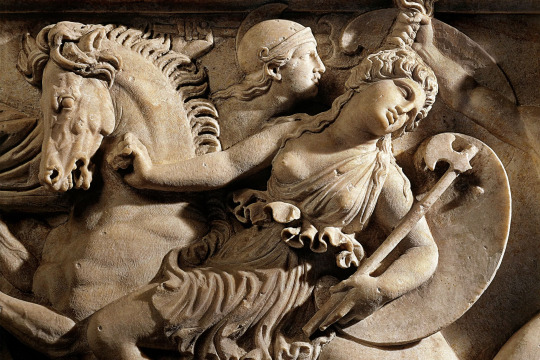
An Amazon and a Greek engage in mortal combat on this second-century A.D. Roman sarcophagus.
Louvre Museum, Paris
#art#amazon#amazons#greek#southern europe#mediterranean#greek mythology#human history#classic art#fine art#european art#classical art#europe#european#fine arts#europa#traditional art#an amazon and a greek#public domain
545 notes
·
View notes
Text
Brian Merchant’s “Blood In the Machine”
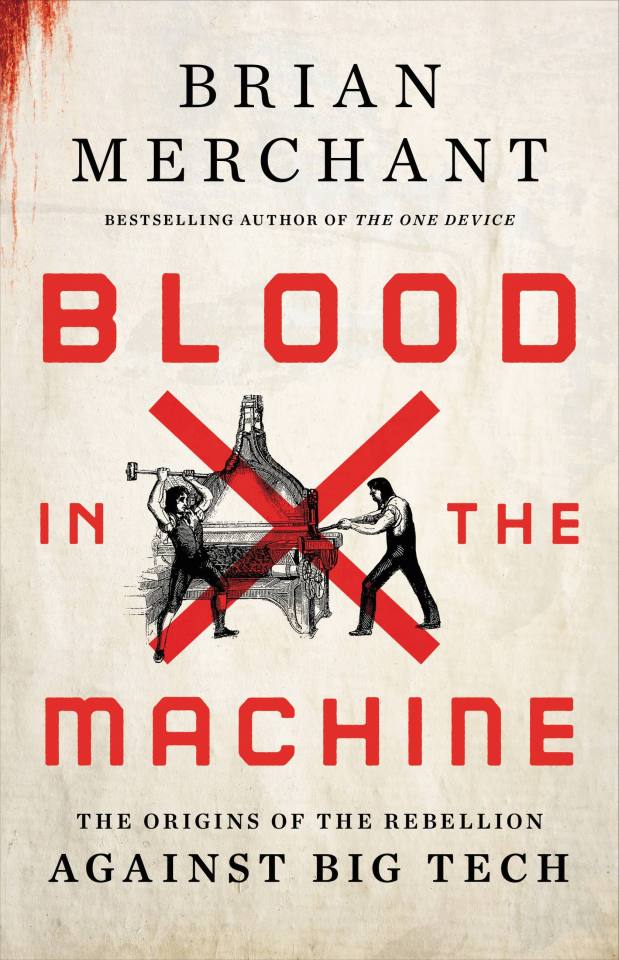
Tomorrow (September 27), I'll be at Chevalier's Books in Los Angeles with Brian Merchant for a joint launch for my new book The Internet Con and his new book, Blood in the Machine. On October 2, I'll be in Boise to host an event with VE Schwab.

In Blood In the Machine, Brian Merchant delivers the definitive history of the Luddites, and the clearest analysis of the automator's playbook, where "entrepreneurs'" lawless extraction from workers is called "innovation" and "inevitable":
https://www.littlebrown.com/titles/brian-merchant/blood-in-the-machine/9780316487740/
History is written by the winners, and so you probably think of the Luddites as brainless, terrified, thick-fingered vandals who smashed machines and burned factories because they didn't understand them. Today, "Luddite" is a slur that means "technophobe" – but that's neither fair, nor accurate.
Luddism has been steadily creeping into pro-labor technological criticism, as workers and technology critics reclaim the term and its history, which is a rich and powerful tale of greed versus solidarity, slavery versus freedom.
The true tale of the Luddites starts with workers demanding that the laws be upheld. When factory owners began to buy automation systems for textile production, they did so in violation of laws that required collaboration with existing craft guilds – laws designed to ensure that automation was phased in gradually, with accommodations for displaced workers. These laws also protected the public, with the guilds evaluating the quality of cloth produced on the machine, acting as a proxy for buyers who might otherwise be tricked into buying inferior goods.
Factory owners flouted these laws. Though the machines made cloth that was less durable and of inferior weave, they sold it to consumers as though it were as good as the guild-made textiles. Factory owners made quiet deals with orphanages to send them very young children who were enslaved to work in their factories, where they were routinely maimed and killed by the new machines. Children who balked at the long hours or attempted escape were viciously beaten (the memoir of one former child slave became a bestseller and inspired Oliver Twist).
The craft guilds begged Parliament to act. They sent delegations, wrote petitions, even got Members of Parliament to draft legislation ordering enforcement of existing laws. Instead, Parliament passed laws criminalizing labor organizing.
The stakes were high. Economic malaise and war had driven up the price of life's essentials. Workers displaced by illegal machines faced starvation – as did their children. Communities were shattered. Workers who had apprenticed for years found themselves graduating into a market that had no jobs for them.
This is the context in which the Luddite uprisings began. Secret cells of workers, working with discipline and tight organization, warned factory owners to uphold the law. They sent letters and posted handbills in which they styled themselves as the army of "King Ludd" or "General Ludd" – Ned Ludd being a mythical figure who had fought back against an abusive boss.
When factory owners ignored these warnings, the Luddites smashed their machines, breaking into factories or intercepting machines en route from the blacksmith shops where they'd been created. They won key victories, with many factory owners backing off from automation plans, but the owners were deep-pocketed and determined.
The ruling Tories had no sympathy for the workers and no interest in upholding the law or punishing the factory owners for violating it. Instead, they dispatched troops to the factory towns, escalating the use of force until England's industrial centers were occupied by literal armies of soldiers. Soldiers who balked at turning their guns on Luddites were publicly flogged to death.
I got very interested in the Luddites in late 2021, when it became clear that everything I thought I knew about the Luddites was wrong. The Luddites weren't anti-technology – rather, they were doing the same thing a science fiction writer does: asking not just what a new technology does, but also who it does it for and who it does it to:
https://locusmag.com/2022/01/cory-doctorow-science-fiction-is-a-luddite-literature/
Unsurprisingly, ever since I started publishing on this subject, I've run into people who have no sympathy for the Luddite cause and who slide into my replies to replicate the 19th Century automation debate. One such person accused the Luddites of using "state violence" to suppress progress.
You couldn't ask for a more perfect example of how the history of the Luddites has been forgotten and replaced with a deliberately misleading account. The "state violence" of the Luddite uprising was entirely on one side. Parliament, under the lackadaisical leadership of "Mad King George," imposed the death penalty on the Luddites. It wasn't just machine-breaking that became a capital crime – "oath taking" (swearing loyalty to the Luddites) also carried the death penalties.
As the Luddites fought on against increasingly well-armed factory owners (one owner bought a cannon to use on workers who threatened his machines), they were subjected to spectacular acts of true state violence. Occupying soldiers rounded up Luddites and suspected Luddites and staged public mass executions, hanging them by the dozen, creating scores widows and fatherless children.
The sf writer Steven Brust says that the test to tell whether someone is on the right or the left is simple: ask whether property rights are more important than human rights. If the person says "property rights are human rights," they are on the right.
The state response to the Luddites crisply illustrates this distinction. The Luddites wanted an orderly and lawful transition to automation, one that brought workers along and created shared prosperity and quality goods. The craft guilds took pride in their products, and saw themselves as guardians of their industry. They were accustomed to enjoying a high degree of bargaining power and autonomy, working from small craft workshops in their homes, which allowed them to set their own work pace, eat with their families, and enjoy modest amounts of leisure.
The factory owners' cause wasn't just increased production – it was increased power. They wanted a workforce that would dance to their tune, work longer hours for less pay. They wanted unilateral control over which products they made and what corners they cut in making those products. They wanted to enrich themselves, even if that meant that thousands starved and their factory floors ran red with the blood of dismembered children.
The Luddites destroyed machines. The factory owners killed Luddites, shooting them at the factory gates, or rounding them up for mass executions. Parliament deputized owners to act as extensions of law enforcement, allowing them to drag suspected Luddites to their own private cells for questioning.
The Luddites viewed property rights as just one instrument for achieving human rights – freedom from hunger and cold – and when property rights conflicted with human rights, they didn't hesitate to smash the machines. For them, human rights trumped property rights.
Their bosses – and their bosses' modern defenders – saw the demands to uphold the laws on automation as demands to bring "state violence" to bear on the wholly private matter of how a rich man should organize his business. On the other hand, literal killing – both on the factory floor and at the gallows – was not "state violence" but rather, a defense of the most important of all the human rights: the rights of property owners.
19th century textile factories were the original Big Tech, and the rhetoric of the factory owners echoes down the ages. When tech barons like Peter Thiel say that "freedom is incompatible with democracy," he means that letting people who work for a living vote will eventually lead to limitations on people who own things for a living, like him.
Then, as now, resistance to Big Tech enjoyed widespread support. The Luddites couldn't have organized in their thousands if their neighbors didn't have their backs. Shelley and Byron wrote widely reproduced paeans to worker uprisings (Byron also defended the Luddites in the House of Lords). The Brontes wrote Luddite novels. Mary Shelley's Frankenstein was a Luddite novel, in which the monster was a sensitive, intelligent creature who merely demanded a say in the technology that created him.
The erasure of the true history of the Luddites was a deliberate act. Despite the popular and elite support the Luddites enjoyed, the owners and their allies in Parliament were able to crush the uprising, using mass murder and imprisonment to force workers to accept immiseration.
The entire supply chain of the textile revolution was soaked in blood. Merchant devotes multiple chapters to the lives of African slaves in America who produced the cotton that the machines in England wove into cloth. Then – as now – automation served to obscure the violence latent in production of finished goods.
But, as Merchant writes, the Luddites didn't lose outright. Historians who study the uprisings record that the places where the Luddites fought most fiercely were the places where automation came most slowly and workers enjoyed the longest shared prosperity.
The motto of Magpie Killjoy's seminal Steampunk Magazine was: "Love the machine, hate the factory." The workers of the Luddite uprising were skilled technologists themselves.
They performed highly technical tasks to produce extremely high-quality goods. They served in craft workshops and controlled their own time.
The factory increased production, but at the cost of autonomy. Factories and their progeny, like assembly lines, made it possible to make more goods (even goods that eventually rose the quality of the craft goods they replaced), but at the cost of human autonomy. Taylorism and other efficiency cults ended up scripting the motions of workers down to the fingertips, and workers were and are subject to increasing surveillance and discipline from their bosses if they deviate. Take too many pee breaks at the Amazon warehouse and you will be marked down for "time off-task."
Steampunk is a dream of craft production at factory scale: in steampunk fantasies, the worker is a solitary genius who can produce high-tech finished goods in their own laboratory. Steampunk has no "dark, satanic mills," no blood in the factory. It's no coincidence that steampunk gained popularity at the same time as the maker movement, in which individual workers use form digital communities. Makers networked together to provide advice and support in craft projects that turn out the kind of technologically sophisticated goods that we associate with vast, heavily-capitalized assembly lines.
But workers are losing autonomy, not gaining it. The steampunk dream is of a world where we get the benefits of factory production with the life of a craft producer. The gig economy has delivered its opposite: craft workers – Uber drivers, casualized doctors and dog-walkers – who are as surveilled and controlled as factory workers.
Gig workers are dispatched by apps, their faces closely studied by cameras for unauthorized eye-movements, their pay changed from moment to moment by an algorithm that docks them for any infraction. They are "reverse centaurs": workers fused to machines where the machine provides the intelligence and the human does its bidding:
https://pluralistic.net/2021/02/17/reverse-centaur/#reverse-centaur
Craft workers in home workshops are told that they're their own bosses, but in reality they are constantly monitored by bossware that watches out of their computers' cameras and listens through its mic. They have to pay for the privilege of working for their bosses, and pay to quit. If their children make so much as a peep, they can lose their jobs. They don't work from home – they live at work:
https://pluralistic.net/2021/01/22/paperback-writer/#toothless
Merchant is a master storyteller and a dedicated researcher. The story he weaves in Blood In the Machine is as gripping as any Propublica deep-dive into the miserable working conditions of today's gig economy. Drawing on primary sources and scholarship, Blood is a kind of Nomadland for Luddites.
Today, Merchant is the technology critic for the LA Times. The final chapters of Blood brings the Luddites into the present day, finding parallels in the labor organizing of the Amazon warehouse workers led by Chris Smalls. The liberal reformers who offered patronizing support to the Luddites – but didn't imagine that they could be masters of their own destiny – are echoed in the rhetoric of Andrew Yang.
And of course, the factory owners' rhetoric is easily transposed to the modern tech baron. Then, as now, we're told that all automation is "progress," that regulatory evasion (Uber's unlicensed taxis, Airbnb's unlicensed hotel rooms, Ring's unregulated surveillance, Tesla's unregulated autopilot) is "innovation." Most of all, we're told that every one of these innovations must exist, that there is no way to stop it, because technology is an autonomous force that is independent of human agency. "There is no alternative" – the rallying cry of Margaret Thatcher – has become our inevitablist catechism.
Squeezing the workers' wages conditions and weakening workers' bargaining power isn't "innovation." It's an old, old story, as old as the factory owners who replaced skilled workers with terrified orphans, sending out for more when a child fell into a machine. Then, as now, this was called "job creation."
Then, as now, there was no way to progress as a worker: no matter how skilled and diligent an Uber driver is, they can't buy their medallion and truly become their own boss, getting a say in their working conditions. They certainly can't hope to rise from a blue-collar job on the streets to a white-collar job in the Uber offices.
Then, as now, a worker was hired by the day, not by the year, and might find themselves with no work the next day, depending on the whim of a factory owner or an algorithm.
As Merchant writes: robots aren't coming for your job; bosses are. The dream of a "dark factory," a "fully automated" Tesla production line, is the dream of a boss who doesn't have to answer to workers, who can press a button and manifest their will, without negotiating with mere workers. The point isn't just to reduce the wage-bill for a finished good – it's to reduce the "friction" of having to care about others and take their needs into account.
Luddites are not – and have never been – anti-technology. Rather, they are pro-human, and see production as a means to an end: broadly shared prosperity. The automation project says it's about replacing humans with machines, but over and over again – in machine learning, in "contactless" delivery, in on-demand workforces – the goal is to turn humans into machines.
There is blood in the machine, Merchant tells us, whether its humans being torn apart by a machine, or humans being transformed into machines.
Brian and I are having a joint book-launch tomorrow night (Sept 27) at Chevalier's Books in Los Angeles for my new book The Internet Con and his new book, Blood in the Machine:
https://www.eventbrite.com/e/the-internet-con-by-cory-doctorow-blood-in-the-machine-by-brian-merchant-tickets-696349940417



If you'd like an essay-formatted version of this post to read or share, here's a link to it on pluralistic.net, my surveillance-free, ad-free, tracker-free blog:
https://pluralistic.net/2023/09/26/enochs-hammer/#thats-fronkonsteen
#pluralistic#books#reviews#brian merchant#luddism#automation#history#gift guide#steampunk#makers#tina#inevitablism#reverse centaurs#amazon#arise
546 notes
·
View notes
Note
I wouldn't mind the heavy focus on warrior Amazons so much if they were allowed to be competent instead of just being used as red shirt cannon fodder. But it seems DC only hypes up the Amazons as deadly fighters so other characters can look more impressive when they take them down.
Oh and Happy New Year.
Happy New Year! Forgive me if I use your ask to talk about a piece of the Wonder Woman mythos I've wanted to discuss for some time, because your complaints offered me the perfect segue to write a nice, in-depth meta on it and I couldn't pass up the opportunity.
Honestly, I think a lot of people (both creatives and readers) either don't know, forget, or fundamentally misunderstand the nature of the Amazons' warrior status. So they often get reduced to "deadly warriors who strike first," "supposedly deadly but generally incompetent warriors when outside of their own books," or "militant man-haters" by a lot of people. None of which are true.
The Amazons are incredibly competent warriors and have been since Marston's first portrayal of them in the 1940s, so I don't inherently mind them being shown as such. However, where people get bogged down is insisting that they be shown as deadly and trigger-happy offensive fighters who are happy to strike first and hard, which fundamentally goes against the philosophy and thematic messaging built into Amazonian lore.
DC's Amazonia, lore-wise, is traditionally framed as an Aphrodite vs. Ares "peace and love vs. violence and war" story. In Marston's original rendition of the Amazon's backstory Aphrodite is not only their patron goddess but also their sole creator; it was only after Crisis on Infinite Earths and George Perez's long-overdue lore expansions that the rest of the goddesses became co-creators and co-patrons of the Amazons. Regardless, Ares and his domain are consistently invoked as what the Amazons don't want to be like or engage in. That behavior is the antithesis of what Amazons are supposed to be. This lore informs literally everything about how the Amazons view both their combat abilities and their duty to the goddesses.
The contemporary Amazons are, for the most part, women who died in terrible and traumatic ways at the hands of men (usually through domestic violence, murder, or as conquests of war). When the goddesses created the Amazons by reincarnating these women via the Well of Souls, they specifically charged them to become their champions. And what did these goddesses want? They explicitly wanted justice and protection for women in a violently patriarchial world. The Amazons being warriors is thus specifically tied to an understanding of necessary self-defense and protection (both of themselves and other women), not offense.
Which of course is what lands the Amazons on Themyscira in the first place: invoking the goddesses' ire by not obeying these commands after their rebellion against their enslavement by Heracles and his men crosses the line from the necessary battle to achieve their liberation into wanton violence and revenge:
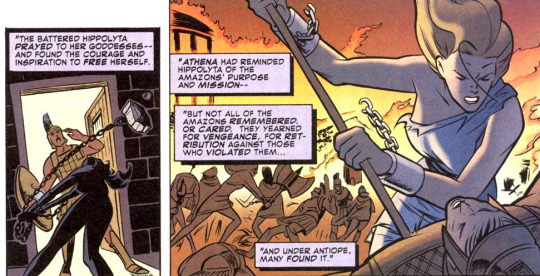
"The battered Hippolyta prayed to her goddesses and found the courage and inspiration to free herself. Athena had reminded Hippolyta of the Amazons' purpose and mission—but not all of the Amazons remembered. Or cared. They yearned for vengeance. For retribution against those who violated them...and under Antiope, many found it." -Wonder Woman: Our Worlds at War (2001)
And as Hippolyta and Menalippe tell Antiope:
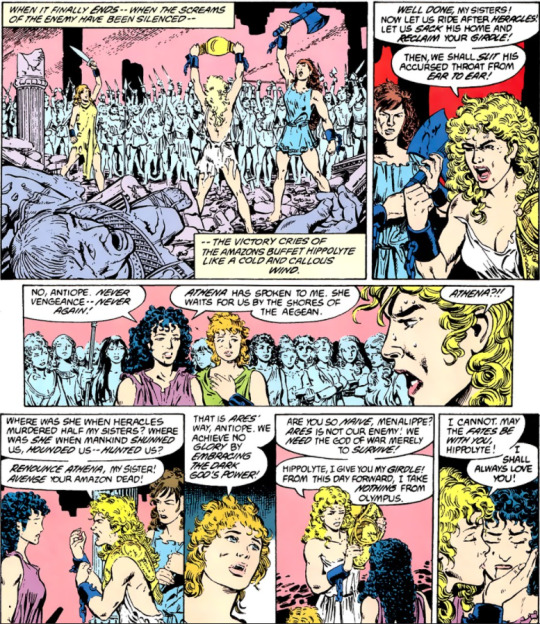
"No, Antiope. Never vengeance; never again!" /// "That is Ares' way, Antiope. We achieve no glory by embracing the Dark God's power!" -Wonder Woman (1987) #1
The Amazon way is promoting a society based on love, equality, truth, and peaceful conflict resolution, not vengeance and violent combat. It's a philosophy that defines Diana's mission in Man's World as an ambassador, teacher, and living example of her peoples' way of life:
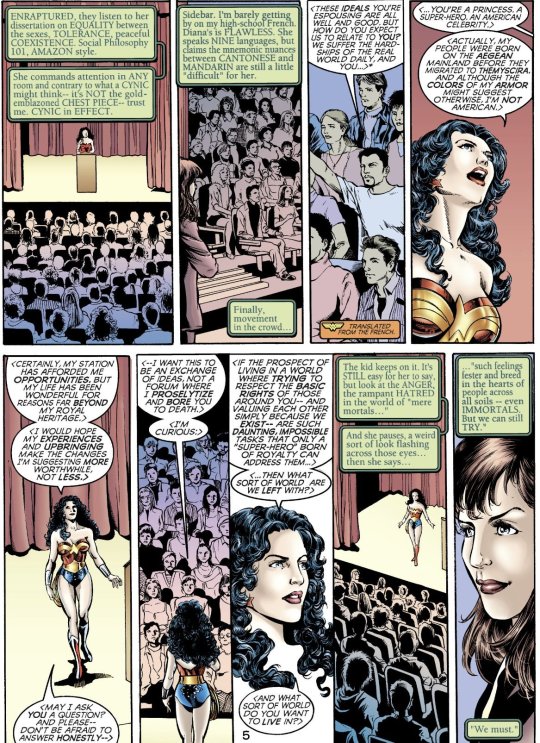
Enraptured, they listen to her dissertation on equality between the sexes, tolerance, peaceful coexistence. Social Philosophy 101, Amazon Style. -Wonder Woman (1987) #170
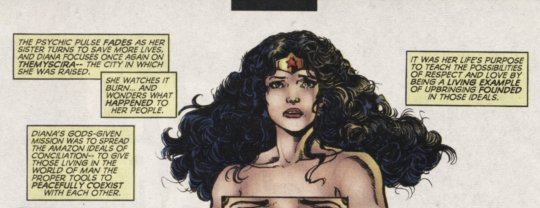
Diana's gods-given mission was to spread the Amazonian ideals of conciliation—to give those living in the World of Man the proper tools to peacefully coexist with each other. It was her life's purpose to teach the possibilities of respect and love by being a living example of an upbringing founded in those ideals.
Truth-seeking, diplomacy, and peace are the Amazonian way of dealing with conflict, not violence. And when you are forced to engage in combat (and you should be prepared for that eventuality because sometimes it will happen), your goal should be self-defense and de-escalation, not offense and prolonging the conflict longer than necessary.
This is also, as an aside, why Diana (and specifically Diana in her capacity as Wonder Woman) does not usually carry offensive weapons like a sword and why her primary "weapons" are the Lasso of Truth and protective bracelets. She's the official representative of her peoples' culture and personally deeply believes in that cultural philosophy. Other Amazons have different views on the matter, including her mother, but Diana grew up completely separated from the World of Man and fully immersed in that belief system, which deeply informs how she views her mission as Wonder Woman.
Personally, I think many (but not all) of the problems re: depicting the Amazons in the modern era come from various writers attempting to solve contradictions that don't exist. They see "kickass trained warriors living peacefully on an island" and see that as a contradiction they have to solve: why do they train if they're pacifists? Why do they fight if they're peaceful? In reality, it's not a contradiction: their status as warriors and champions is specifically tied to self-defense and protection (both of themselves and others), but given the choice they don't want to have to take up arms to protect people because that goes against their fundamental cultural philosophy. Outsiders and meddlesome gods are the ones who force them to do that! What they want is for everyone to be treated with love, respect, and understanding so they don't have to!
And there's a lot of problematic elements built into the concept's execution, but this is the core thesis behind the split between Hippolyta's Themyscirans and Antiope's Bana-Mighdall. The Themysciran Amazons have had their fill of violence and war; they just want to live in peace. But a) they were specifically tasked with guarding Doom's Doorway when they were taken to the island, a duty which necessitates perfect combat readiness, and b) their history is littered with examples of people refusing to leave them alone. So they train, in case someone decides to take shots at them, but otherwise live in peaceful isolation. Meanwhile, the Banas looked at that same shared history and went "we need to take the fight to the outside world. Offense is the best defense, and the only way to protect ourselves and the other women of the world is to actively seek vengeance for the violence women face." So they chose to actively intervene in Man's World, fighting constant battles and exacting revenge for any women mistreated at the hands of men.
...which is also why Artemis was such a necessary and interesting addition to the Wonder Woman mythos (even if she's often handled...poorly), because she and Diana represent two diametrically opposed views of how to protect and represent both their cultures and the women of Man's World, but that's a rant for a different time.
Anyway, the Themysciran Amazons' martial pacifism as a cultural value isn't a contradiction; it's one way of looking at a history filled with violence and victimization and saying "no more." And it's a pretty subversive way of doing so, which (well-written) comics tend to note!
So yes, the "Amazons are warriors" mentality has always been there and has been solidly emphasized at various points throughout Wonder Woman's history, and it should be acknowledged and shown that they're all incredibly competent in battle when they're forced to engage in it. But the way in which it gets emphasized is what defines whether a writer has a solid understanding of the history and baggage that comes with depicting the Amazonian struggle and the socio-political issues embedded in their lore. And unfortunately...many writers just don't seem to get it.
#sorry for just ranting about this but I HAVE to correct the narrative every time this comes up. it's not a want. it's a need.#someone hire me to write a political history of Amazonia#I could do SO MUCH with the recurring themes of isolationism vs. interventionalism as a method of self-defense#dc comics#wonder woman#wonder woman meta#diana of themiscyra#artemis of bana mighdall#queen hippolyta#dc amazons#dc meta#long post#asks
280 notes
·
View notes
Text
cannot believe good omens made ofmd, spn, hannibal and JANE AUSTEN trend
absolutely wild, neil gaiman has far too much power over us
#truly iconic#a moment to go down in tumblr history#im so glad i came back to see this#amazon prime look how good this show is. i am in your walls. PAY YOUR WRITERS.#gonna do my part and add to the trending tags 😌#our flag means death#ofmd#spn#jane austen#good omens#good omens 2#good omens spoilers#i mean not really?? but gonna be careful anyway
1K notes
·
View notes
Text
Scientists have uncovered the Amazon’s earliest and largest example of farm-based city-like settlements high in the foothills of the Ecuadorian Andes.
The thousands of mounds, plazas, terraces, roads and agricultural fields — revealed for the first time in their fullest extent by airborne laser scans — necessitate a rethinking of just how complex ancient civilizations of the Amazon may have been, researchers report in the Jan. 12 Science.
Over the last decade or so, the use of light detection and ranging, or lidar, in archaeology has led to significant discoveries in tropical climates, where ancient settlements often lay obscured beneath dense jungle (SN: 12/4/23). In 2018, researchers released scans of remnants of Mayan settlements in Guatemala, followed by Olmec ruins in Mexico in 2021 and Casarabe sites in the Bolivian Amazon in 2022, all which have been revealed to be metropolitan-like settlements filled with complex infrastructure (SN: 9/27/18; SN: 1/6/23; SN: 5/25/22).
“It’s a gold rush scenario, especially for the Americas and the Amazon,” says Christopher Fisher, an archaeologist at Colorado State University in Fort Collins who has scanned sites throughout the Americas but was not involved in the new research. “Scientists are demonstrating conclusively that there were a lot more people in these areas, and that they significantly modified the landscape,” he says. “This is a paradigm shift in our thinking about how extensively people occupied these areas.”
[...]
Beneath the tree canopy was a massive network of roughly 6,000 mounds — once homes and community spaces — clustered into 15 settlements and connected by an intricate road system. The lidar data also revealed that the open spaces between settlements were in fact agricultural fields that had been drained to grow crops such as maize, beans, sweet potatoes and yucca. Within the settlements, the researchers found tiered gardens that would have kept some food closer at hand.
Put together, the results show that the valley wasn’t simply a series of small villages linked by roads, but “an entirely human-engineered landscape” built by skilled urban planners, Rostain says. Dating from several sites suggests the area was inhabited for roughly 2,000 years beginning around 500 B.C. by at least five different cultural groups. A next step will be to calculate how many people might have lived there.
187 notes
·
View notes
Text
Time Travel Question 46: Early Modernish and Earlier
These Questions are the result of suggestions from the previous iteration.
This category may include suggestions made too late to fall into the correct earlier time grouping. Basically, I'd already moved on to human history, but I'd periodically get a pre-homin suggestion, hence the occasional random item waaay out of it's time period, rather than reopen the category.
In some cases a culture lasted a really long time and I grouped them by whether it was likely the later or earlier grouping made the most sense with the information I had. (Invention ofs tend to fall in an earlier grouping if it's still open. Ones that imply height of or just before something tend to get grouped later, but not always. Sometimes I'll split two different things from the same culture into different polls because they involve separate research goals or the like).
Please add new suggestions below if you have them for future consideration. All cultures and time periods welcome.
#Time Travel#Early Modern#Aztecs#Tenochtitlan#Versailles#Louis XIV#Thames Frost Fair#The Original Amber Room#Vauxhall Gardens#Potlatch#Indigenous History#Pacific Northwest History#The Amazon#South American History#North American History#Cascadia Earthquake#History of Food#Queen Elizabeth I#Tudor England#Kamehameha the Great#Hawaiʻi#Hawaiian History
103 notes
·
View notes
Text
Fluent Freshman - Part 11
PREVIOUS
FF could admit that he may not be working with a full tank at the moment.
He had not slept very well the night before.
He had watched a lot of horror movies (a genre that he generally does not consume because his mind is already a scary enough place).
He was not able to go see his Grandma and he was going to miss the traditional(tm) Black Friday extravaganza that he and his Grandma did every Black Friday since he was little and encountered the horrible truth about Santa and she’d let him in on when / where most of his Christmas gifts were obtained. (The answer was not the North Pole under the watchful eye of elves. He had cried himself to sleep at the revelation but Gran always had a way of making the worst moments of his life tolerable.)
He may have eaten just…a bit too much pie?
He definitely ate too much turkey.
His stomach is killing him because he had forgotten to take his pepto when he had slammed that five hour energy.
His heart may actually break out of his rib cage with how hard it’s beating in his chest.
He’s been listening to Andrew and Captain Neil go back and forth for the last hour and a half between discussing Aaron’s recent mess ups, to what they’ll do to one another with a locked door between them and the world, to Andrew complaining that Neil’s hand is sweaty, to Neil saying Yes and Andrew’s hand is no longer in Neil’s and-
He clenches his eyes close.
And Andrew has swerved back into the lane for the third time in the last five minutes while saying something unrepeatable about his plans for Captain Neil and the whipped cream.
FF does not handle swerving cars very well.
He hears Andrew say something that sounds like it could lead to a very uncomfortable yeast infection for Captain Neil didn’t properly rinse off afterwards.
The car swerves over the rumble strip.
A fear far stronger than his fear of what Andrew could do to him overtakes him.
“I don’t like swerving cars. So, I’m going to ask that you focus on the road and keep your hands on the steering wheel.” FF says so panicked that he sounds calm and he watches as both Neil and Andrew stiffen at the sound of his voice. “If you can’t, then I’m going to ask that you pull over and let me out.” He offers a second option and a part of him is just amazed that his voice doesn’t crack even once. “I’m fine with either option.” He says.
He says both are fine but…
Honestly he hopes Andrew chooses the first option as he looks at the dark and lonely highway.
He looks back up at the front seat and both Neil and Andrew are looking straight forward. Andrew’s hands are on the steering wheel.
“Thanks.” He says and returns his attention to back over Aaron’s head.
The rest of the ride to Columbia is blessedly quiet. Aaron and Nicky wake up when they get off of the interstate and Nicky has the good grace to try and wipe the drool out of FF’s hair while Aaron seems unbothered by the wet spot he left of FF’s shoulder.
They get out of the car and they each grab their own bag in exhausted silence. Nicky is barely managing to put one foot in front of the other and before FF can do or say anything Nicky is in his room and has locked his door.
The room that FF had been planning on sleeping on the floor of because Nicky had told him he could so that FF would not drink 20 5-hour energies over the course of the weekend.
But Nicky had looked really tired.
So he is given a general tour by a very quiet Captain Neil and FF forces himself not to think about the cooler that Andrew had brought to, what he assumes is, Andrew’s bedroom before it was brought to the kitchen. He gets shown where the blankets and pillows that Kevin uses are and FF nods in quiet acceptance even knowing that he is going to spend the night going over Katakana flashcards and maybe up his literacy on Kanji to a second grader’s level.
Captain Neil wishes him a good night while Andrew gives him a nod and it is the last time he sees Captain Neil that night.
It is not the last time he sees Andrew.
***
Andrew comes out of his room to go get two glasses of water nearly 2 and a half hours later. The house is silent and dark. He is pretty sure him and Neil are the only two up.
He is wrong.
He comes out into the living room on his way to the kitchen and finds FF going through flashcards at a rapid pace. He walks a little closer to see what it is but the flashcards aren’t even right side up half of the time.
He thinks about the car ride.
‘I don’t like swerving cars.’
FF had said it so matter of factly. He was uncomfortable with the swerving.
Andrew had told FF recently about the words he didn’t like.
It felt like FF was offering at least something of himself back to Andrew for the first time.
Andrew thinks about how once his hands had gone back to the steering wheel FF had leaned back into his seat and stared out the window.
Andrew has at various points tried to look up what FF’s circumstances were but searching news sites for someone named ‘Smith’ with no first name to work off of was an exercise in futility.
Neil has lamented many times to Andrew about his bizarre jealousy over how unknowable Smith is. “He’s learning new languages, keeping a low profile, and playing Exy. It’s everything that I wanted in my freshman year and couldn’t manage because Riko pissed me off so much! It’s just kind of hard to see someone living my dream.” He says.
Andrew had punched him in the arm for that one.
“My old dream!” Neil had said and Andrew almost punched him again for the smile he flashed but had ended up kissing his stupid pretty face instead.
Where was he?
Right.
FF didn’t like swerving cars.
It didn’t necessarily have to be the trauma that lead to that aversion. Andrew certainly hadn’t had anything scare him on a plane but he still hated flying.
Still.
“The flash card is upside down.” He says and watches as FF pauses in his shuffling before righting that card and flipping to the next one which was turned to the side as far as Andrew could tell.
FF should be asleep.
FF is not asleep.
It might be Andrew’s fault that his friend can’t sleep.
“It won’t happen again.” He says and FF turns and stares at him blankly for a few seconds before he nods his acceptance.
It’s nice having a friend who understands what he means without needing to explain every little thing.
***
FF thinks he might have double-dosed on the 5-hour energy.
He also thinks he might currently be able to see through time.
His flashcards are making so much sense right now.
Then Andrew had come up and it truly was a miracle that he did not shit himself considering the sheer amount of apple pie still making its way through his system. That’s a lot of fiber for one body and he’s sure the 2-3 Five Hour energies he has taken are not helping his plight in that regard.
“It won’t happen again.” Is what Andrew says and in an instant FF feels his stomach drop to his feet. He nods blankly and watches as Andrew nods back before the man went to the kitchen and left with two tall glasses of water.
‘It won’t happen again’
FF has asked Andrew for TWO favors today.
TWO WHOLE FAVORS.
WHAT WAS HE THINKING?
The answer was that he WASN’T.
Even if FF had paid back one of those favors with the sheer power of his granny’s pie there was the case of the secondary favor he’d asked for in the car.
‘It won’t happen again’
There won’t be anymore favors for FF. He’d used up any mercy his grandma’s pie had bought him.
He considers the time pulls out his phone and goes through some saved text files on his phone.
It’s time for guns even bigger than his grandma’s apple pie.
He takes another five hour energy and knows that he won’t be sleeping a wink. He looks up groceries stores that are open this early on Black Friday, he grabs his wallet and with immense fear in his heart grabs the keys Aaron had dropped into a bowl by the front entrance.
He needs the ingredients for his great-grandma’s brownies.

Do your civic duty and: CAST YOUR VOTE TODAY ABOUT MEMES
NEXT
Per y’all’s requests:
@i-have-three-feelings @blep-23 @dreamerking27 @andreilsmyreligion @belodensetdust @rainbowpineapplebottle @yarn-ace @iwouldlikesometea @lily-s-world @obscureshipsandchips @booklover242 @whataboutmyfries @sahturnos @pluto-pepsi @dreamerthinker @passinhosdetartaruga @leftunknownheart @aro-manita-muscaria @hologramsaredead @Chaoticgremlinswishtheycouldbeme @tntwme @tayspots @nick-scar @crazy-fangirl2524 @blue-jos10 @stabbyfoxandrew @splishsplashyouropinionistrash @sammichly @the-broken-pen @bitchesdoweknowu @very-small-flower @ghostlyboiii @its-a-paxycab @bisexual-genderfluid-fan @cheesecookie
@theoneandonlylostsock @foxsoulcourt @blueleys @adverbialstarlight @elia-nna @can-i-just-stay-in-the-corner @nikodiangel @foxandcrow-inatrenchcoat @hallucinatedjosten
As stated before if you’re up here and I spelled it right but you didn’t get a notification there might be something switched around in your settings that won’t let me tag you properly?
#Fluent Freshman AU#FF's logical reasoning has not ever been his strong suit#But it really tanks when he's hitting levels of manic tired#Andrew goes back into the room with the water for him and Neil#Andrew: FF isn't mad about the car thing#Neil: Oh thank god#Neil: Wait did you hear the door just now?#Andrew: No#Neil: Oh okay I'm sure it's fine.#My search history is a nightmare now#Could Neil get a yeast infection? I'm sure the answer is readily available for me#I thought FOOLISHLY#I got like 12 different think pieces on it when I wanted a YES or a NO#Now Amazon wants to sell me creams that I do NOT need#This is what I get for having searched it on my iphone in the google app#I should have waited to get home and search in Firefox#But I (ever the fool) needed my answers now#AFTG#AFTG AU#AFTG OC#AFTG Shitpost#Andreil#FF - Pt. 11
444 notes
·
View notes
Text

In the World’s Largest Rainforest, a Prehistoric Metropolis Emerges After More Than 2,500 Years
99 notes
·
View notes
Text
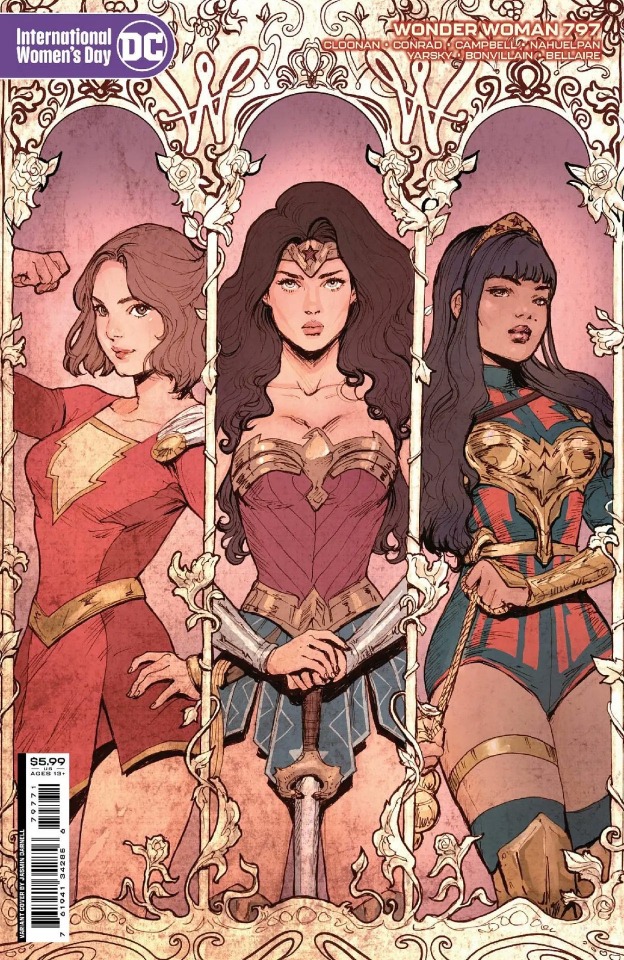
Jasmin Darnell's International Women's Day variant cover for WONDER WOMAN #797 out in March!
#dc comics#diana prince#wonder woman#wonder girl#wonder woman aniversary#amazons#amazons of themyscira#cassie sandsmark#diana of themyscira#donna troy#yara flor#queen hippolyta#artemis#trialsoftheamazons#amazons history#artemis of bana mighdall#nubia and the amazons#amazon tribu#shazam#mary#mary marvel
228 notes
·
View notes
Text
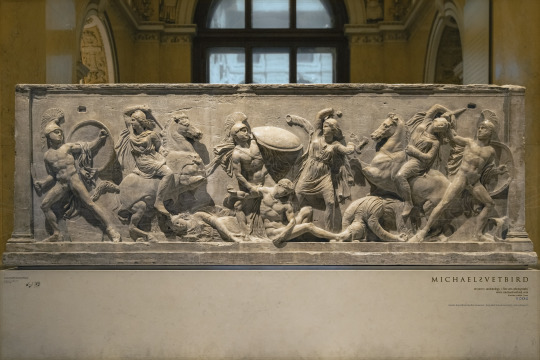
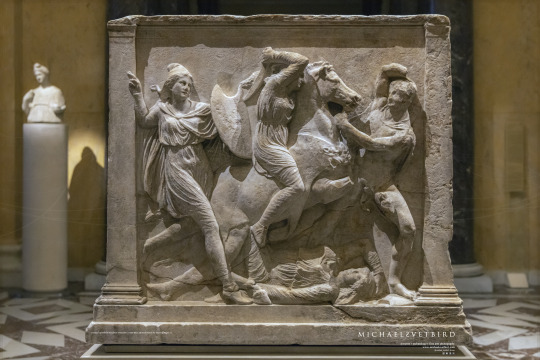
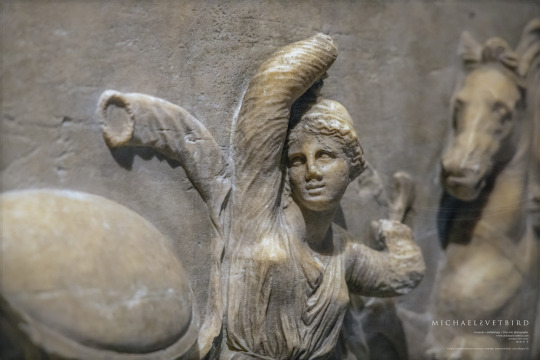
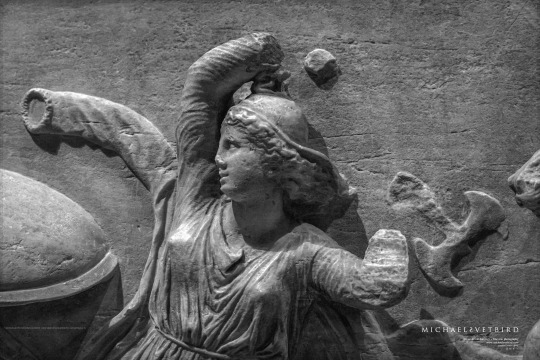

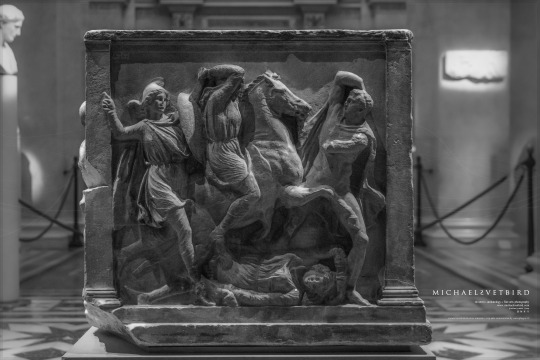
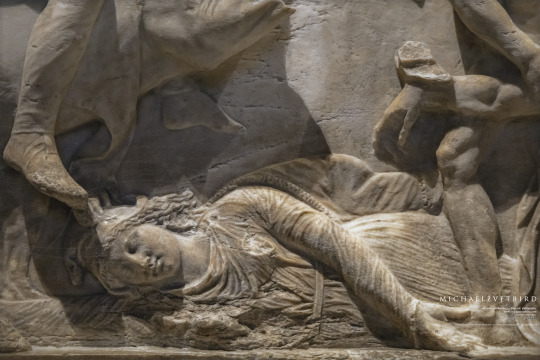
AMAZONOMACHY Sarcophagus
From Soli, Northern Cyprus [found in 1557]
https://en.wikipedia.org/wiki/Soli,_Cyprus
Hellenistic period, 2nd half of the 4th c. BC
Marble
Provenance and additional data:
https://www.khm.at/objektdb/detail/50832
KunstHistorisches Museum, Vienna | KHMV
["Ancient Greece and Rome", Saal XI]
• Web : https://www.khm.at/en
• FB : https://www.facebook.com/KHMWien
• IG : @kunsthistorischesmuseumvienna
KHMV | Michael Svetbird phs©msp | 08|23 6300X4200 600 [I.-VII.]
The photographed object is collection item of KHMV, photos are subject to copyright.
[non commercial use | sorry for the watermarks]
📸 Part of the "SARCOPHAGI:Reliefs" MSP Online Photo-gallery:
👉 D-ART:
https://www.deviantart.com/svetbird1234/gallery/69396046/sarcophagi-reliefs
👉 FB | Album:
https://www.facebook.com/media/set/?set=a.843393602695885&type=3
.
#vienna#kunsthistorisches museum#history museum#archaeological museum#sarcophagi msp#sarcophagus#ancient sculpture#ancient art#antiquity#ancient#cyprus#archaeology#museology#greek mythology#art history#hellenistic#amazons#αμαζόνες#amazonen#amazzoni#amazones#oiorpata#warrior women#amazonomachy#photo gallery#art photography#archaeology photography#sculpture photography#museum photography#michaelsvetbird
109 notes
·
View notes
Photo

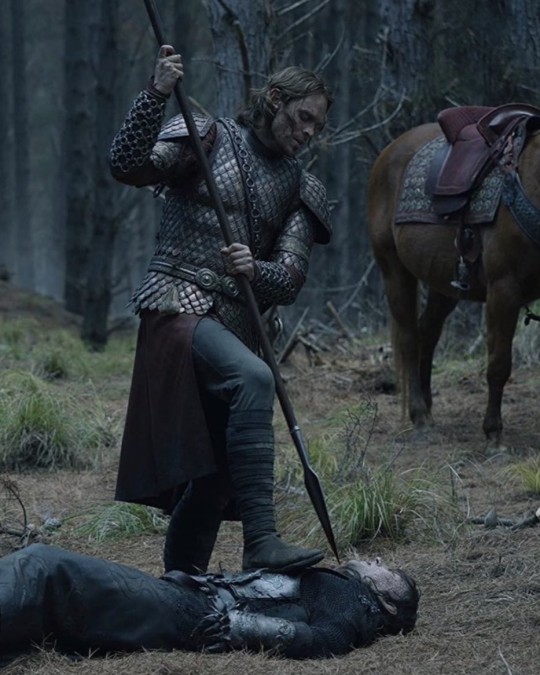
saint michael vanquishing satan (1518) // lord of the rings: the rings of power (2022)
#web weaving#saint michael#art history#rafael#halbrand#charlie vickers#adar#joseph mawle#rings of power#ringsofpoweredit#amazon lotr#lotr on prime#tolkien#The Silmarillion#rings of power spoilers
1K notes
·
View notes
Text
The internet is not a (link)dump truck

Monday (October 2), I'll be in Boise to host an event with VE Schwab. On October 7–8, I'm in Milan to keynote Wired Nextfest.

The second decade of the 21st century is truly a bounteous time. My backyard has produced a bumper crop of an invasive species of mosquito that is genuinely innovative: rather than confining itself to biting in the dusk and dawn golden hours, these stinging clouds of flying vampires bite at every hour that God sends:
https://themagnet.substack.com/p/the-magnet-081-war-with-mosquitoes
Here in the twilight of capitalism's planet-devouring, half-century orgy of wanton destruction, there's more news every day than I can possibly write a full blog post about every day, and as with many weeks, I have arrived at Saturday with a substantial backlog of links that didn't fit into the week's "Hey look at this" linkdumps.
Thus, the eighth installment in my ongoing, semiregular series of Saturday linkdumps:
https://pluralistic.net/tag/linkdump/
This week, the miscellany begins with the first hesitant signs of an emerging, post-neoliberal order. The FTC, under direction of the force-of-nature that is Lina Khan, has brought its long-awaited case antitrust case against Amazon. I am very excited about this. Disoriented, even.
When was the last time you greeted every day with a warm feeling because high officials in the US government were working for the betterment of every person in the land? It's enough to make one giddy. Plus, the New York Times let me call Amazon "the apex predator of our platform era"! Now that it's in the "paper of record," it's official:
https://pluralistic.net/ApexPredator
Now, lefties have been predicting capitalism's imminent demise since The Communist Manifesto, but any fule kno that the capitalist word for "crisis" also translates as "opportunity." Like the bedbugs that mutated to thrive in clouds of post-war DDT, capitalism has adapted to each crisis, emerging in a new, more virulent form:
https://boingboing.net/2023/09/30/bedbugs-take-paris.html
But "anything that can't go on forever will eventually stop" (Stein's Law). Perhaps our mistake was in waiting for capitalism to give way to socialism, rather than serving as a transitional phase between feudalism and…feudalism.
What's the difference between feudalism and capitalism? According to Yanis Varoufakis, it comes down to whether we value rents (income you get from owning things) over profits (income you get from doing things):
https://pluralistic.net/2023/09/28/cloudalists/#cloud-capital
By that metric, the FTC's case against Amazon is really a case against feudalism. Through predatory pricing and acquisitions, Amazon has turned itself into a chokepoint that every merchant, writer and publisher has to pass through in order to reach their customers. Amazon charges a fortune to traverse that chokepoint (estimates range from 45% to 51% of gross revenues) and then forces sellers to raise their prices everywhere else when they hike their Amazon prices so they can afford Amazon's tolls. It's "an economy-wide hidden tax":
https://www.thebignewsletter.com/p/the-ftc-sues-to-break-up-amazon-over
Now, feudalism isn't a straightforward proposition. Like, are you sure you mean feudalism? Maybe you mean "manorialism" (they're easy to mix up):
https://locusmag.com/2021/01/cory-doctorow-neofeudalism-and-the-digital-manor/
Plus, much of what we know about the "Dark Ages" comes from grifter doofuses like Voltaire, a man who was capable of dismissing the 800 year Holy Roman Empire with a single quip ("neither holy, roman, nor an empire"). But the reality is a lot more complicated, gnarly and interesting.
That's where medievalist Eleanor Janeaga comes in, and her "Against Voltaire, or, the shortest possible introduction to the Holy Roman Empire" is a banger:
https://going-medieval.com/2023/09/29/against-voltaire-or-the-shortest-possible-introduction-to-the-holy-roman-empire/
Now, while it's true that Enlightenment thinkers gave medieval times a bum rap, it's likewise true that a key element of Enlightenment justice is transparency: justice being done, and being seen to be done. One way to distinguish "modern" justice from "medieval" trials is to ask whether the public is allowed to watch the trial, see the evidence, and understand the conclusion.
Here again, there is evidence that capitalism was a transitional phase between feudalism and feudalism. The Amazon trial has already been poisoned by farcical redactions, in which every key figure is blacked out of the public record:
https://prospect.org/power/2023-09-27-redacted-case-against-amazon/
This is part of a trend. The other gigantic antitrust case underway right now, against Google, has turned into a star chamber as well, with Judge Amit P Mehta largely deferring to Google's frequent demands to close the court and seal the exhibits:
https://usvgoogle.org/trial-update-9-22
Google's rationale for this is darkly hilarious: if the public is allowed to know what's happening in its trial, this will be converted into "clickbait," which is to say, "The public is interested in this case, and if they are informed of the evidence against us, that information will be spread widely because it is so interesting":
https://www.bigtechontrial.com/p/secrecy-is-systemic
Thankfully, this secrecy is struggling to survive the public outrage it prompted. While the court's Zoom feed has been shuttered and while Judge Mehta is still all-too-willing to clear the courtroom during key testimony, at least the DoJ's exhibits aren't being sealed at the same clip as before:
https://www.theverge.com/2023/9/27/23892215/google-search-antitrust-trial-documents-public-again-judge-mehta-rules
In 2023, the world comes at you fast. There's an epic struggle over the future of corporate dominance playing out all around us. I mean, there are French antitrust enforcers kicking down doors of giant tech companies and ransacking their offices for evidence of nefarious anticompetitive plots:
https://www.theverge.com/2023/9/28/23894863/nvidia-offices-raided-french-competition-authority
As ever, the question is "socialism or barbarism." But don't say that too loud: in America, socialism is a slur, one that dates back to the Reconstruction era, when pro-slavery factions called Black voting "socialism in South Carolina."
Ever since, white nationalists used "socialism" make Americans believe that "socialism" was an "extremist" view, so they'd stand by while everyone from Joe McCarthy to Donald Trump smeared their opponents as "Marxists":
https://thehill.com/homenews/campaign/4066499-trump-paints-2024-campaign-as-righteous-crusade/
As Heather Cox Richardson puts it for The Atlantic, "There is a long-standing fight over whether support for the modern-day right is about taxes or race. The key is that it is about taxes and race at the same time":
https://www.theatlantic.com/ideas/archive/2023/09/american-socialism-racist-origins/675453/
The cruelty isn't the point, in other words. Cruelty is the tactic. The point is power. Remember, no war but class war. All of this is in service to paying workers less so that bosses and investors can have more.
Take "essential workers," everyone from teachers to zookeepers, nurses to librarians, EMTs to daycare workers. All of these "caring" professions are paid sub-living wages, and all of these workers are told that "they matter too much to earn a living wage":
https://www.okdoomer.io/praise-doesnt-pay/
The "you matter too much to pay" mind-zap is called "vocational awe," a crucial term introduced by Ettarh Fobazi in her 2018 paper:
https://www.inthelibrarywiththeleadpipe.org/2018/vocational-awe/
Vocational awe is how creative workers – like the writers who just won their strike and the actors who are still fighting – are conned into working at starvation wages. As the old joke goes, "What, and give up show-business?"
https://ask.metafilter.com/117904/Whats-the-joke-thas-hase-the-punchline-what-and-give-up-show-business
In this moment of Big Tech-driven, AI-based wage suppression, mass surveillance, corruption and inequality, perhaps we should take a moment to remind ourselves that cyberpunk was a warning, not a suggestion. Or, more to the point, the warning was about high-tech corporate takeover of our lives, and the suggestion was that we could seize the means of computation (a synonym for William Gibson's "the street finds its own use for things"):
http://www.seizethemeansofcomputation.org/
We are living in a lopsided cyberpunk future, long on high-tech corporate takeover, short of computation seizing. This point is made sharply in JWZ's "Dispatch From The Cyberpunk City," which is beautifully packaged as a Hypercard stack that you run on an in-browser Mac Plus emulator from the Internet Archive:
https://www.jwz.org/blog/2023/09/neuroblast-dispatch-from-the-cyberpunk-city/
Cast your gaze ahead, to the near future: Public space has all but disappeared. Corporate landlords use AI-powered robots to harass the homeless. The robots, built slick and white with an R2-D2 friendliness now most resemble giant butt plugs covered in graffiti and grime.
Science fiction doesn't have to be a warning. It can also be a wellspring of hope. That's what I tried to do with The Lost Cause, my forthcoming Green New Deal novel, which Bill McKibben called "The first great YIMBY novel":
https://us.macmillan.com/books/9781250865939/the-lost-cause
Writing a hopeful novel of ecological, social and economic redemption, driven by solidarity, repair, and library socialism, was a powerful tonic against despair in this smoke-smothered, flooded, mosquito-bitten time. And while the book isn't out yet, there are early indications I succeeded, like Kim Stanley Robinson's reaction, "Along with the rush of adrenaline I felt a solid surge of hope. May it go like this."
And now, we have a concurring judgment from The Library Journal, who yesterday published their review, which concludes: "a thought-provoking story, with a message of hope in a near-future that looks increasingly bleak":
https://www.libraryjournal.com/review/the-lost-cause-2196385

If you'd like an essay-formatted version of this post to read or share, here's a link to it on pluralistic.net, my surveillance-free, ad-free, tracker-free blog:
https://pluralistic.net/2023/09/30/mesclada/#melange
#pluralistic#antitrust#amazon#opacity#impunity#vocational awe#cyberpunk#dystopia watch#hypercard#jwz#holy roman empire#voltaire#enlightenment#dark ages#history#eleanor janega#linkdump#linkdumps#the lost cause#science fiction#books
170 notes
·
View notes
Text
Let's spend a few days looking at depictions of the Amazons, the mythical race of fierce female warriors that showed up a lot in Greek literature. You don’t exactly have to be Sigmund Freud to understand why a repressively patriarchal society like Greece would have spent so much time simultaneously entranced and horrified by the question, “What if women had political and military power?”
Here's an image from around 500 BCE of a beautiful (“kalos,” which you can see written in the upper right) Amazon:
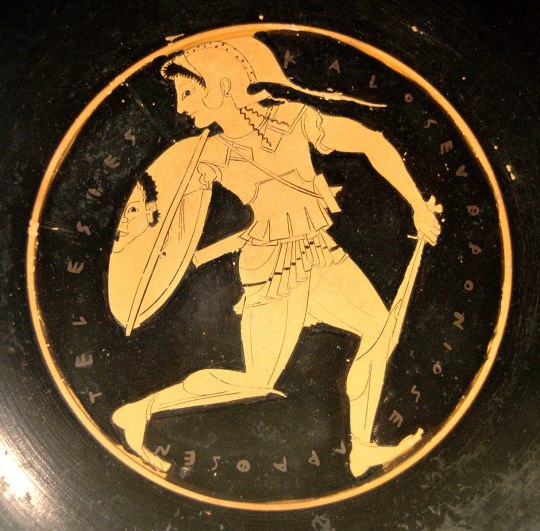
And here’s a vase from 420 BCE on which Theseus fights the Amazons, who, it must be said, are decked out in some pretty nifty patterned clothing.
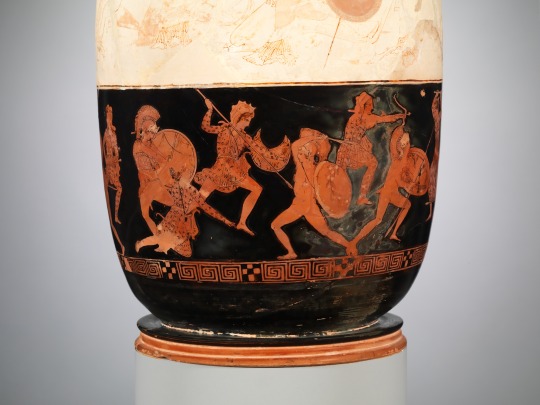
You can read the whole piece here (free friend link):
{WHF} {Ko-Fi} {Medium}
253 notes
·
View notes